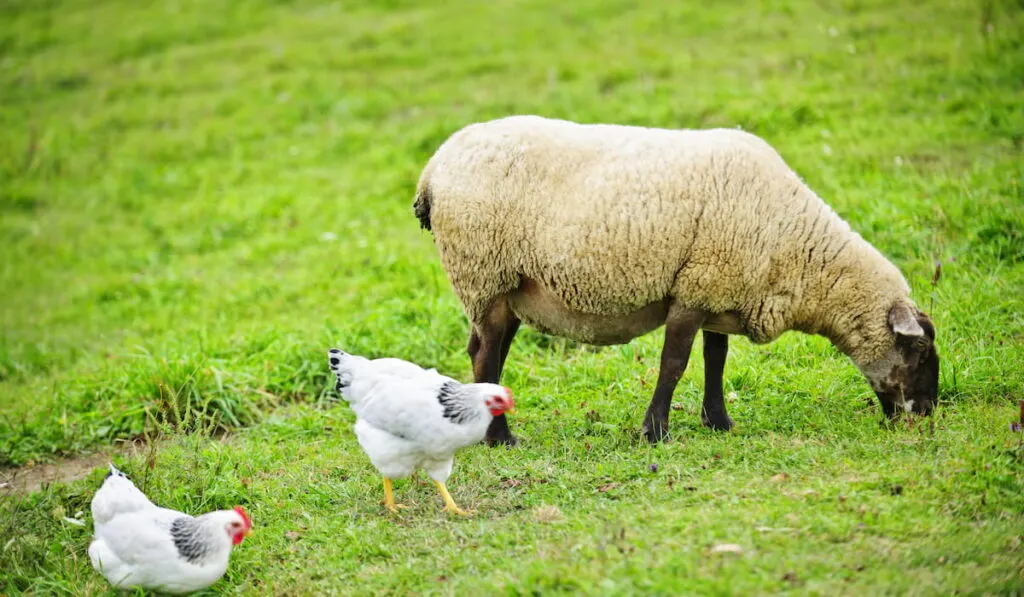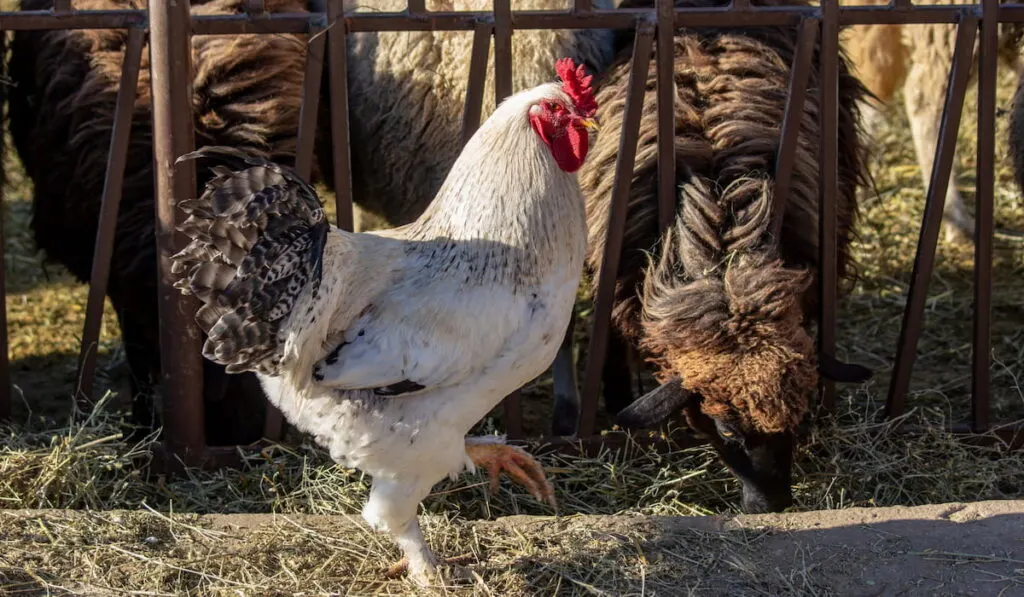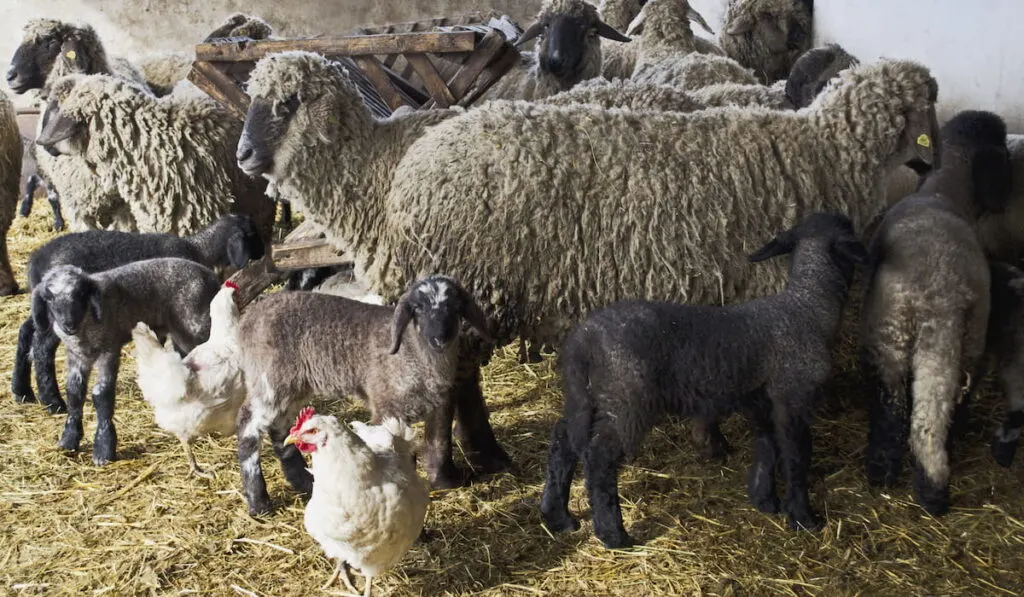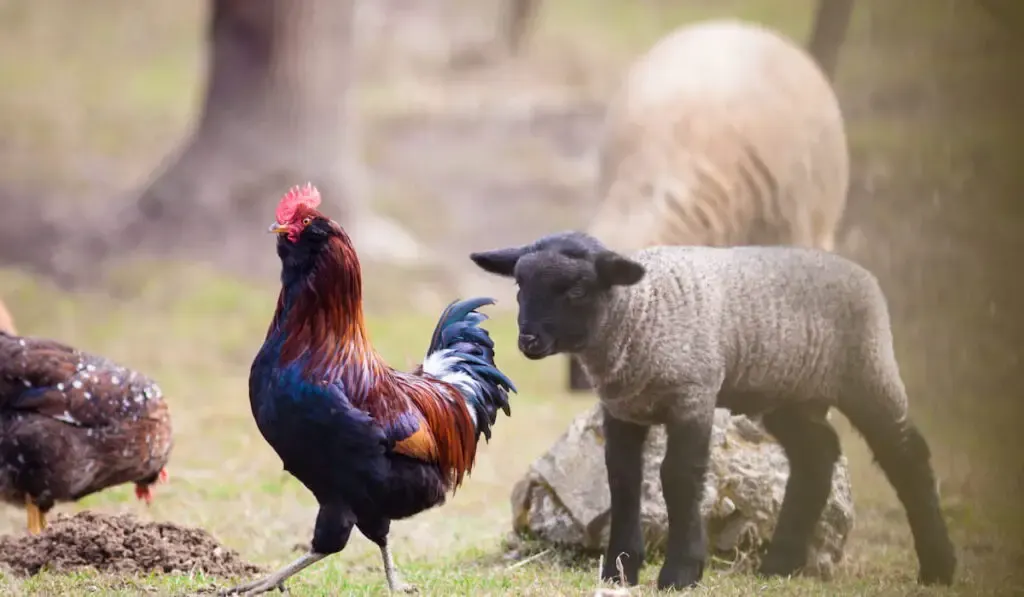The Relationship Between Sheep and Chickens
Can sheep and chickens live together? Absolutely, yes. Ruminants and poultry have a symbiotic relationship, where both the sheep and chickens benefit from being close to one another.
Ruminants want clean pasture that has no parasites, flies, snails, and slugs, with robust forage for them to enjoy.
Chickens, in addition to other poultry, also benefit when out roaming with ruminants like sheep. Chickens delight in a vast area to peck, scratch, and hunt in. They also need some protection or distraction from predators, and living with a herd of sheep meets these needs.

Staying close to a sheep is beneficial to the chicken, as the sheep dislodge insects and bugs as they graze.
As long as they hang around the sheep, they get to enjoy the meal. Sheep are also known to be attentive and will protect the chickens from any impending danger from predators like foxes or hawks.
Flocking sheep and chicken together also works perfectly, since there is no competition for food between them.
The sheep focus on eating the grass, while chickens are always pecking around for bugs, and at times the softer grass shoots. Sheep and chickens, therefore, complement each other, because each benefits from the company of the other.
Pens and Feed for Sheep and Chickens
Sheep and chickens graze and roam together in the fields, but it is not recommended to feed them in the same area, but rather have different spaces for offering feed and minerals.
Chickens are omnivores, and their diet is quite diverse. Some of their feeds may contain animal by-products, which is not healthy for sheep.
Other chicken feeds may also have a larger amount of copper than sheep can handle. Other chicken feeds, including grains, are not good for sheep. Grains encourage a different rumen bacteria to thrive, leading to excessive gas that froths and stagnates in the stomach.
This can be painful for the sheep. Too much acidity associated with bloating can also be fatal, if not addressed in time.
Chickens do not, however, have any trouble when dealing with the sheep feed. They carefully pick on the pieces that they find interesting and leave out the rest.
Sheep feeds are not bad for chickens, but should not be entirely fed to them since they do not have the correct balanced ratios.
However, with everything else that chickens eat, regular rations in the chickens’ diet are usually restored to optimal.
Sheep and chickens are therefore a perfect match, as long as their feeds are separated.

Benefits of Keeping Sheep and Chickens Together
Parasite and Disease Control
Rearing sheep and chickens together greatly reduces the spread of parasites and diseases. Both sheep and chickens are prone to parasites but cross-transmission of parasites between the two is minimal.
Most of the diseases that affect either are specific to the particular species. There may, however, be cases of transmittal but they are not common.
Flocking sheep with chickens will help you with parasite management, which can potentially reduce the use of pharmaceuticals to kill the parasites or treat the sheep.
Chickens normally pick through the sheep droppings in search of worm and fly larvae. To the chicken, these are tasty morsels, but this is in fact a way of reducing the transmission of parasites from sheep to sheep.
Sheep, on the other hand, don’t do much to scale down the parasites in chicken, but rather help in scattering the chicken droppings around the grazing area, which greatly reduces the chances that chickens will re-infect themselves or others with parasites found in their manures.
Disease control is a benefit that comes with flocking sheep and chicken together. To ensure proper health, however, you have to ensure there is proper sanitation and circulation of free and clean air.
Chickens eat any snails or slugs that may be on the grazing paths of the sheep and consequently help in protecting the sheep from deer worms.
It is important to encourage chickens to sleep in their own pens but share pastures with the sheep during the day.
Sheep should be kept out of the chicken coop to ensure that the sanitation of grain for chicken is upheld. This helps a lot in ensuring the common health issues associated with both chickens and sheep are avoided.
Predator Control and Prevention
Besides the stability and companionship of the sheep, chickens also gain a sense of safety and security when with larger animals in numbers. The latter discourages predators like foxes, coyotes, and weasels from stalking and attacking the chickens.
Some predators can still remain a threat, especially those who can scale fences like raccoons and aerial predators like eagles and hawks. But the sheep lend a hand in intimidating and scaring them off.
It is also good to take precautionary measures against predators and the general safety of the flock, such as erecting fences that would ensure their security.
With regard to size and other factors, sheep and chickens have different capabilities and limitations, and using methods like putting up page wire fences will help keep them in check, as their spaces are small enough not to allow the chicken to pass through and are tall enough to discourage sheep jumping over.

Best Utilization and Easy Management of Space
Flocking sheep and chickens together also helps save space. Having a vast space for grazing as well as being resourceful enough for the chicken to peck through for food makes this arrangement practical.
Consider installing clean drinking water points that will serve both the sheep and chickens in their barns and the grazing fields also eases the farm management.
Having sheep and chicken barns adjacent or side by side with each other also helps save space and does away with the need for lots of fencing. Having a single fence around the barns will work perfectly, compared to having separate barns that will be more costly and requires more space.
A single enclosure will also help you reduce the time spent when performing chores like cleaning and giving the animals their respective feeds.
Disadvantages of Keeping Sheep and Chickens Together
Although sheep and chickens can share forage and grazing fields, it is not recommended to house the two together.
Flocking them together works just fine, but when they share the same barn or housing, there are higher risks of transmission and spread of particular parasites and diseases that may be common to the two.
Chickens naturally harbor the salmonella bacteria in their intestines. The one shortcoming with chickens is that they are never precise with where they deposit their droppings, and the sheep are greatly affected when exposed to the salmonella bacteria.
In sheep, this bacteria is hosted in the udders of the nursing ewes, and can easily be transferred to the lambs by their mothers. This bacteria can be lethal to the lambs if not addressed by a vet in time.
Most parasites and diseases are transmitted through the contamination of bedding, feeds, and drinking water. Keeping their respective spaces clean will therefore greatly help lower the risk of transmission.
The sheep will not deliberately eat chicken droppings, but the chickens leave their droppings everywhere, including in the sheep’s drinking water, making it important to keep chickens away from the sheep’s drinking troughs.
What Animals Can Live With Chickens?
Chickens are social animals and as long as their safety and security are not threatened, they can get along with almost every other animal, especially ruminants.
They should not, however, be kept with other members of the bird family, like geese and ducks, as this would increase the risk of transfer of parasites and diseases, subsequently increasing the mortality rates.

Chickens can cross-graze with cows, horses, donkeys, goats, sheep, and llamas, by carefully pecking through the fields for maggots, larvae, and parasites. Most of the parasites are species-specific and do not affect the chicken.
They also spread the manure around the fields and mix it with soil. Chickens should not be allowed to mingle with livestock under any form of chemical medication or de-wormers, as they can be exposed to toxic substances excreted by the animals.
What Animals Cannot Be Kept With Chickens?
Predation prevention is much more recommended than trapping or eliminating predators that may be praying on chickens.
It is a fact that no flock can be completely safe from predators, as at times, the potential predators could be within the domesticated home, as in the case of domestic cats and dogs that also prey on chickens.
Other farm animals that may prove to be a threat to chickens are pigs, who are known to attack and eat them.
Other chicken predators include raccoons, hawks, snakes, and foxes. Fences should help keep some like foxes and raccoons out, while for others like hawks and owls, the company of sheep and larger animals will help scare them off.
Conclusion
Flocking sheep and chickens together works perfectly fine, as both benefit from the companionship of each other.
A farmer should, however, be careful to maintain separate feeding and roosting spaces to avoid the sheep consuming chicken feed, and bedding contamination, which could spread shared parasites and diseases.
Resources
- https://agricsite.com/can-sheep-and-chickens-live-together/
- https://morningchores.com/raising-sheep-and-chickens/
- https://www.homesteadingtoday.com/threads/pasturing-sheep-and-chickens.475996/
- https://familyfarmlivestock.com/raising-farm-animals-together-what-works-and-what-doesnt/
- https://www.knowyourchickens.com/animals-to-keep-with-chickens/
- https://opensanctuary.org/article/chickens-and-other-species/
